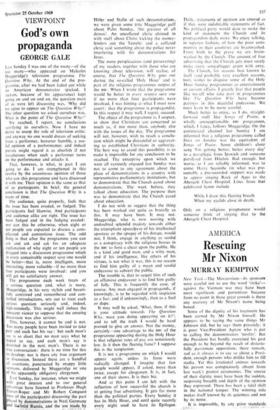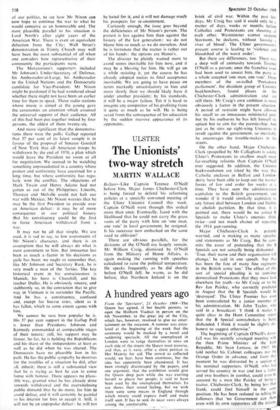AMERICA
Rescuing Mr Nixon
MURRAY KEMPTON
New York—The Moratorium—its sponsors were careful not to use the word 'strike'— against the Vietnam war may have been most significant and portentous because from no point in these great crowds is there any memory of Mr Nixon's name being booed.
Some of the dignity of his treatment has been earned by Mr Nixon himself. He appears to be saying the same things Mr Johnson did, but he says them privately; it is poor Vice-President Agnew who is put to calling the demonstrators 'misfits'. But the President has hardly exorcised his past enough to be beyond the reach of distaste- fully passionate opposition; there remain, sad as it always is to say so about a Presi- dent, enough persons who dislike him to fill stadia. Yet this irrational animus towards his person was conspiciously absent from last week's protest ceremonies. The source of their dignity must have been the sudden, surprising breadth and depth of the opinion they expressed. There has been a tidal shift in the national temper. The winning side makes itself known by its quietness and not by its noise.
It is impossible, by any prior standards
of our politics, to see how Mr Nixon can now hope to continue the war to what he would conceive as an honourable end. The most plausible parallel to his situation is Lord North's after eight years of the American War. There is even an equivalent defection from the City; Wall Street's demonstration in Trinity Church may well have been the most substantial of all when one considers how representative of their community the participants were.
The Moratorium's supporters included Mr Johnson's Under-Secretary of Defence, his Ambassador-at-Large, his Ambassador to the United Nations and the Democratic candidate for Vice-President; Mr Nixon might be pardoned if he had wondered aloud whether there might not have been an earlier time for them to speak. Those radio stations whose music is aimed at the -young gave the ceremonies an attention which assumed the universal support of their audience. All of this had been put together indeed by four persons, the oldest of them twenty-six.
And more significant than the demonstra- tions there were the polls: Gallup reported that 57 per cent of its latest sample is in favour of the proposal of Senator Goodell of New York that all American troops be withdrawn by the end of 1970, a plan which would leave the President no room at all for negotiation. We seemed to be watching something unprecedented in a country where protest and conformity have coexisted for a long time, but where conformity has regu- larly won the conflict. The objections of Mark Twain and Henry Adams had not gotten us out of the Philippines; Lincoln, Thoreau and Melville could not halt our war with Mexico; Mr Nixon worries that he may be the first President to preside over an American defeat: it may be of more consequence in our political history that his constituency could be the first to force American withdrawal from a war.
It may not be all that simple. We are used, it is sad to say, to low assessments of Mr Nixon's character, and there is an assumption that he will always do what is most convenient to him. But innocence has been as much a•factor in his decisions as guile has been; we ought to remember that, like Mr Johnson and Secretary Rusk, he is very much a man of the 'forties. The key historical event in his consciousness is Munich, his hero is Churchill, and his teacher Dulles. He is obviously sincere, and stubbornly so, in the conviction that to give way in Vietnam is to surrender the Pacific. And he has a constituency, confused and, except for hoarse cries, silent as it has fallen, which to some extent agrees with him.
We cannot be sure how popular he is. His 57 per cent support in the Gallup Poll is lower than Presidents Johnson and Kennedy commanded at comparable stages of their tenure; still, his support may be firmer. So far, he is holding the Republicans and his share of the independents at least as well as he did when he was elected. The Democrats have no plausible lion in his path. He has the public sympathy he deserves for the troubles of a situation he did, after all, inherit; there is still a substantial view that he is trying as best he can to_ come home with honour. There appears no plaus- ible way, granted what he has already done towards withdrawal and the overwhelming public demand that he do more, for him to avoid defeat, and it will certainly be painful to his interior for him to accept it. Still, it will not be an unpopular defeat: he will not be hated for it, and it will not damage much his prospects for re-anointment.
Curiously enough, the issue goes beyond the deficiencies of Mr Nixon's person. The protest is less against him than against the history of the last generation: we do not blame him so much as we do ourselves. And he is fortunate that the matter is rather out of his hands: the options are Hanoi's.
The disaster he plainly wanted most to avoid seems inevitable for him now, and it may be a blessing for him. He will go on a while resisting it, yet the course he has already adopted makes its final acceptance inevitable. We are going to have peace on terms markedly unsatisfactory to him and more slowly than we should likely have it under another president; by his standards, it will be a major failure. Yet it is hard to imagine any competitor of his profiting from it quite as much as he will. He is being saved from the consequence of his education by the sudden massive appearance of its opponents.



















































 Previous page
Previous page